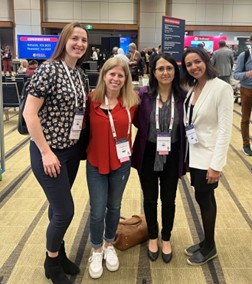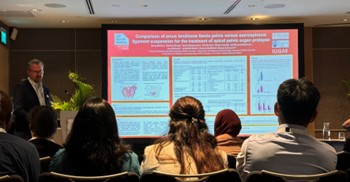McGill University Researchers:
- Maryse Larouche, MD, MPH
- Jens-Erik Walter, MD
- Lisa Merovitz, MD
- Past fellows : Adi Reuveni-Salzman, Jouhayna Bentaleb, Mihnea Gangal

Our division has been quite active from a research perspective (please refer to list below). We are very sad to be losing our division director, Dr Maryse Larouche, to UBC, but we wish her all the best in her future endeavours. She has big research shoes to fill, but Dr Walter has assumed her role as Associate Clinical Scientist at the St Mary’s Research Centre. Dr Lisa Merovitz has taken over as Urogynecology Division Director in addition to her position as Chief of Gynecology at St. Mary’s Hospital. Dr Walter now resumes fellowship program directorship.
We have presented our research at national and international meetings over the past year and have additional upcoming accepted papers:
2024 CPSM Meeting, Montreal
- Comparison of Arcus Tendineus Fascia Pelvis Versus Sacrospinous Ligament Suspension for the Treatment of Apical Pelvic Organ Prolapse, oral presentation
- Comparison of outcomes between vaginal natural orifice transluminal endoscopic surgery (vNOTES) vs. laparoscopic approaches to uterosacral ligament suspension for apical pelvic organ prolapse, oral presentation
- Bladder neck versus mid-urethral placement of retropubic autologous fascial slings: results of a systematic review, oral presentation
2024 IUGA Meeting, Singapore
- Comparison of arcus tendineus fascia pelvis versus sacrospinous ligament suspension for the treatment of apical pelvic organ prolapse, oral presentation
- Comparison of outcomes between vaginal natural orifice transluminal endoscopic surgery (vNOTES) vs. laparoscopic approaches to uterosacral ligament suspension for apical pelvic organ prolapse, oral presentation
- Trans-Vaginal Endoscopic Extraperitoneal Myomectomy, video presentation
2025 IUGA/EUGA, Barcelona
- COMET (Composite Outcomes of MEsh vs suture Techniques for prolapse repair)- Short term outcomes for a double blinded randomized controlled multicenter trial testing a novel surgical technique, oral presentation
2025 AUGS, Vancouver
- Mesh versus suture for sacrospinous repair- Intraoperative outcomes of a randomized controlled trial, oral presentation
- Long-term outcomes of vNOTES versus laparoscopic uterosacral ligament suspension for apical pelvic organ prolapse, oral presentation
- vNOTES uterosacral ligament hysteropexy; a prospective study, perioperative and short-term outcomes, e-poster presentation
- Intra-operative Crede versus Preoperative Reduction Stress Test to Predict De Novo Stress Urinary Incontinence, e-poster presentation
- Pelvic organ prolapse burden on female body image and sexuality: A cohort study, e-poster presentation
- Prospective study on electronic patient reported outcomes in pelvic organ prolapse surgery, e-poster presentation
Dr Walter is the lead faculty for vNOTES training in Canada. Our division is involved in training numerous residents and fellows in this technique and are actively carrying out workshops and surgical proctoring throughout Canada and the US. We conducted a vNOTES workshop at the 2024 CSPM meeting in Montreal and will repeat this to a larger and more international Urogyne-focussed audience at the 2025 AUGS meeting in Vancouver.
Dr Walter serves on the AUGS Publications Committee and completed his term on the AUGS Scientific Committee.

---
Highlighted publication:
Title: vNOTES versus Laparoscopic Uterosacral Ligament Suspension for Apical Pelvic Organ Prolapse: Perioperative and Short-Term Outcomes
Abstract:
Introduction and Hypothesis: Vaginal Natural Orifice Transluminal Endoscopic Surgery (vNOTES) is a novel approach in gynecological surgery. This study was aimed at comparing perioperative and short-term postoperative outcomes of vNOTES versus laparoscopic approaches to uterosacral ligament suspension (USLS) for apical pelvic organ prolapse.
Methods: A retrospective cohort study included all women who underwent vNOTES versus laparoscopic USLS at two university-affiliated centers between 2017 and 2023. The relationships between variables were tested using Fisher’s exact test or t test, including a sub-analysis comparing hysterectomy and hysteropexy outcomes within the groups. Logistic regression assessed the influence of baseline factors and operative factors on the primary and main secondary outcomes of interest.
Results:
This study comprised 47 vNOTES and 54 laparoscopic USLS cases (including 11 and 15 hysteropexies respectively). Baseline demographics in the two groups were similar. There were no differences in operative outcomes and no instances of ureteral injury. The vNOTES technique allowed for the use of significantly more sutures per side (2.0 [2.0–4.0] vs 1.0 [1.0–1.0], p = 0.001). Postoperative complications within 6 weeks demonstrated no significant differences. Both groups exhibited comparable rates of baseline subjective POP symptoms (100% vs 96.2%, p = 1.00) which improved significantly at 6 weeks (4.3% vs 11.1%, p = 0.282). At 6 weeks, anatomical success was achieved by significantly more patients with vNOTES (93.5% vs 78.6%, p = 0.042). Baseline and 6-week POP symptoms in the hysterectomy and hysteropexy subgroups were similar.
Conclusion:
Both vNOTES and laparoscopic USLS demonstrated comparable subjective success rates at 6 weeks postoperatively. The vNOTES approach demonstrated improved anatomical success at 6 weeks, but the difference was not significant after adjusting for operative factors.
Summary:
We retrospectively compared outcomes of the vNOTES vs. laparoscopic uterosacral ligament suspension approaches. We found no instance of ureteral injury in either group. Both groups improved significantly. Anatomic success was higher in the vNOTES vs. laparoscopic group at 6 weeks postoperatively. Longer term study is planned to determine if this difference persists over time and results in differing subjective outcomes.
To view the full list of McGill Publications, visit this link.
---
Current Studies/Investigations/Projects:
I. vNOTES uterosacral hysteropexy, August 2023 – present. Prospective case series of vNOTES USLS hysteropexy. Funded through Quebec Aging Research Network Grant.
i. Co-PIs: Larouche M, Gangal M (primary applicant for grant)
ii. Co-investigators: Reuveni-Salzman A, Walter JE, Merovitz L
iii. Completed patient recruitment. Finalizing one year follow-up.
II. Patient decision aids for urinary incontinence, December 2021 – present. Prospective study including patient needs assessments, literature review, development and pilot testing of patient decision aid tools for urinary incontinence (development of two separate tools for SUI and OAB). Funded through Quebec Aging Research Network Grant.
i. Co-PIs: Larouche M and Nadeau G (University Laval)
ii. Co-investigators: Dumoulin C, Légaré F, Walter JE, Merovitz L
iii. Needs assessment and systematic literature review completed.
iv. Development of decision aids completed. Pilot testing being completed summer 2025.
III. COMET RCT (COMPOSITE OUTCOMES OF MESH VS SUTURE TECHNIQUES FOR PROLAPSE REPAIR: A RANDOMIZED CONTROLLED MULTICENTRE TRIAL), June 2017 – present: Randomized trial comparing sacrospinous vault fixation with permanent mesh arms vs. permanent sutures for vault prolapse with 2 years follow-up
i. Principal investigator: Geoffrion R
ii. Site investigators: Larouche M, Walter JE
iii. Recruitment stopped early. Finalizing 2-year follow-up of recruited participants
Community:
Our team serves the population of Montreal and its surrounding area. We approximate 500 pelvic floor surgeries are performed by our division annually.
